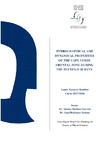Identificador persistente para citar o vincular este elemento:
https://accedacris.ulpgc.es/jspui/handle/10553/75072
| Título: | Hydrographical and dynamical properties of the Cape Verde frontal zone during the fluxes-II survey | Autores/as: | Navarro Sánchez, Laura | Director/a : | Martínez Marrero, Antonio Rodríguez Santana, Ángel |
Clasificación UNESCO: | 251007 Oceanografía física | Palabras clave: | Cape Verde Frontal zone Cap Blanc System Upwelling Filament Anticyclonic structure |
Fecha de publicación: | 2018 | Resumen: | The Cape Verde Frontal Zone (CVFZ) separates North and South Atlantic Central Waters in the upper thermocline waters of the eastern North Atlantic Subtropical Gyre. High resolution moving vessel profiler (SeaSoar) and shipboard Acoustic Doppler Current Profiler (SADCP) data from a 220x167 km grid carried out in November 2017 are used to identify the front location and to study its hydrographical and dynamical properties. The water mass boundary is revealed to be a strong thermohaline front where sharp gradients in salinity, temperature and oxygen in the upper 400 m are shown. Chlorophyll-a images, Mercator model and ADCP data indicate the presence of an anticyclonic structure that produce a complex and extensive interleaving of North Atlantic Central Waters (NACW) and South Atlantic Central Waters (SACW). A clear relation between spatial variations of water mass properties and currents are observed, demonstrating the importance of advection in the distribution of water masses. This distribution of central waters in turn determines a complex spatial variation of double diffusive processes, although a moderate salt fingers regime predominates. In addition, as the front is situated in the Cap Blanc upwelling system, in situ observations and remotely sensed data reflect the presence of a large upwelling filament caused by the anticyclonic structure. This cold and fresh filament, which reach 300 km from the coast, is a shallow feature of about 100 m depth, identified by a minimal surface salinity and rich in chlorophyll-a. The high turbidity value measured under the filament evidence the sinking of suspended particles. This result reflects the important role of the filaments in the export of organic carbon from coastal areas rich in biomass to the deep ocean. They also suggest that the temporal variation of the export of organic carbon in the Cap Blanc upwelling system would ultimately be determined by the eddies generated in the CVFZ. | Departamento: | Departamento de Física | Facultad: | Facultad de Ciencias del Mar | Titulación: | Grado en Ciencias del Mar | URI: | https://accedacris.ulpgc.es/handle/10553/75072 |
| Colección: | Trabajo final de grado Restringido ULPGC |
En el caso de que no encuentre el documento puede ser debido a que el centro o las/os autoras/es no autorizan su publicación. Si tiene verdadero interés en el contenido del mismo, puede dirigirse al director/a o directores/as del trabajo cuyos datos encontrará más arriba.
Vista completaVisitas
59
actualizado el 10-ene-2026
Descargas
14
actualizado el 10-ene-2026
Google ScholarTM
Verifica
Comparte
Exporta metadatos
Los elementos en ULPGC accedaCRIS están protegidos por derechos de autor con todos los derechos reservados, a menos que se indique lo contrario.
